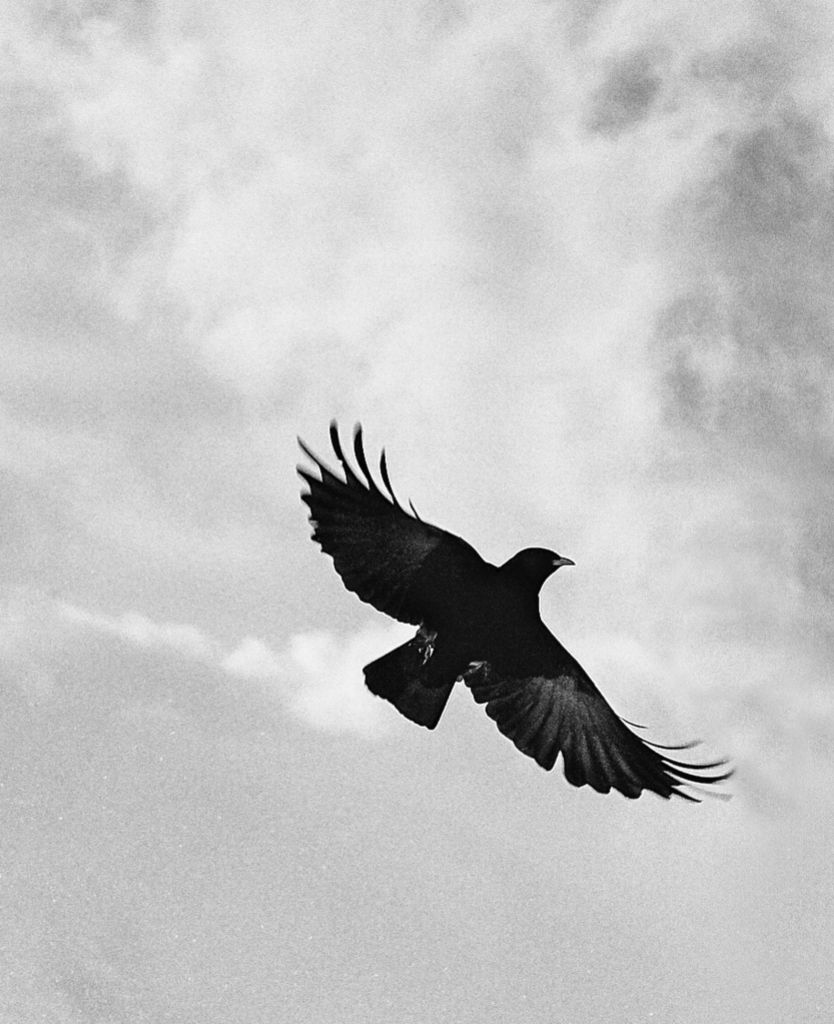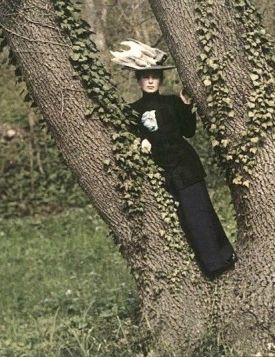* * *
She tried to see them once. Waited behind the pineapple-curtained kitchen window until she heard them chittering in the bird-tree outside. She leapt up, tore the curtain aside, stared out into the cool and quiet. Looked up, saw nothing but the far-receding stars. Nothing but the Night.
*
The Night.
When he rolled over to her, his naked velvet skin as dark as the darkness, his white-rimmed eyes like a pair of dawn streetlamps about to flicker out. When he smelled like morning, hot and moist and bright. When he rumbled something to her, rumbled the way other men would whisper, and she flung her arm across her face, too tired to listen.
The Night. The cold of her bed when he left the room, the pale brittle cold that comes from absence.
*
Sometimes she thinks the trains are the worst part. The tracks split out around the house, and she swears the both of 'em fill together like a forked gutter in the rain. The trains come when she's settling down for tea, or filling the tub for her bath, or lighting a pale cigarette over the kitchen sink; she hears the shrill announcing blast in the distance and watches the pineapple-curtains for a sudden backlight, a stream of molten gold playing out there in the darkness. It never comes.
There is something unfair, she thinks, about a train sounding by in the pitch black. Blasting its horn but hiding its lights. Unfair, like day-rain without a rainbow. Biting a cigarette between her teeth, she strikes a match on the box and drops it, flickering, into the sink.
*
It rains. She hears the cool beads hammering on the roof like they too want to come in out of the wet. When the wind blows, some stray droplets slam against the eastern windows. Once, though she knows better, she pulls the curtains back. The glass is dry and dark.
*
Then there are the children. The clickity-slap of plastic jump ropes on concrete, the thump-thump-whoosh of tiny sneakered feet. The scrape of sidewalk chalk, the tinkling of tricycle bells, the warm full rubbery bounce of hand-me-down kickballs. Some days she thinks she can hear them giggling, whispering their infant secrets.
It wouldn't be so bad, she thinks, if their mothers would call them in for dinner. If they got sleepy and toddled home to bed.
One day, she promises herself, she will scream out the empty window—Don't you know what time it is? But she is afraid that if she does, they will never come back.
*
The Night.
He stands in the doorway, shower-wet, his hair and clothes sticking flat to his body. He's soaped away his daylight-smell. "I'm going," he says. "I'll be back in the morning."
"Mm-hm." She rolls onto her side, facing the dark window.
"I love you, baby."
"Yeah."
"Aren’t you going to say goodbye?"
"You hush," she mumbles. "I’ll still be here when you get home."
A long pause. She waits to feel his warmth fill the bed beside her. It doesn’t.
"You promise?" he says.
"Yeah," she says, "I promise."
*
And she keeps that promise, doesn’t she? Still in that house, the pink house, the Nighthouse, up in the hills between the train tracks, the house with the pineapple-curtains and the broad hopscotch sidewalks and the big bird-tree out front. Still in that house, waiting for morning. I'm true, she thinks, I'm true as day follows night. True as day follows night.
*
The worst part is the doorbell. The way it trips two tones together, sings out ba-by, ba-by while she comes running from the kitchen, rubbing at her eyes, combing her hair with her fingers. The way she hears his footsteps creaking on the doorstep as she fumbles with the lock.
"I'm still here," she says, flinging the door wide.
There's nobody there. Nothing but the far-receding stars.
Monday, August 11, 2014



This piece is hauntingly beautiful, evoking a sense of loneliness and longing. The vivid imagery and emotions conveyed through each section create a captivating narrative that leaves me reflecting on the complexities of life and human connections.
ReplyDeleteAwesome blog yoou have here
ReplyDeleteThis feels like a very strange and mysterious story. The way she hears the birds but can’t see them makes it feel a bit scary and lonely like something magical or not quite right is happening. I am working on my marketing communication assignment and I am not sure if I’m on the right track. There are so many parts to cover like strategy channels and audience and I want to make sure I include everything. Do you follow any specific format or structure? How do you start your research? I’d really appreciate it if anyone could share some tips or examples. Let me know what worked best for you!
ReplyDelete